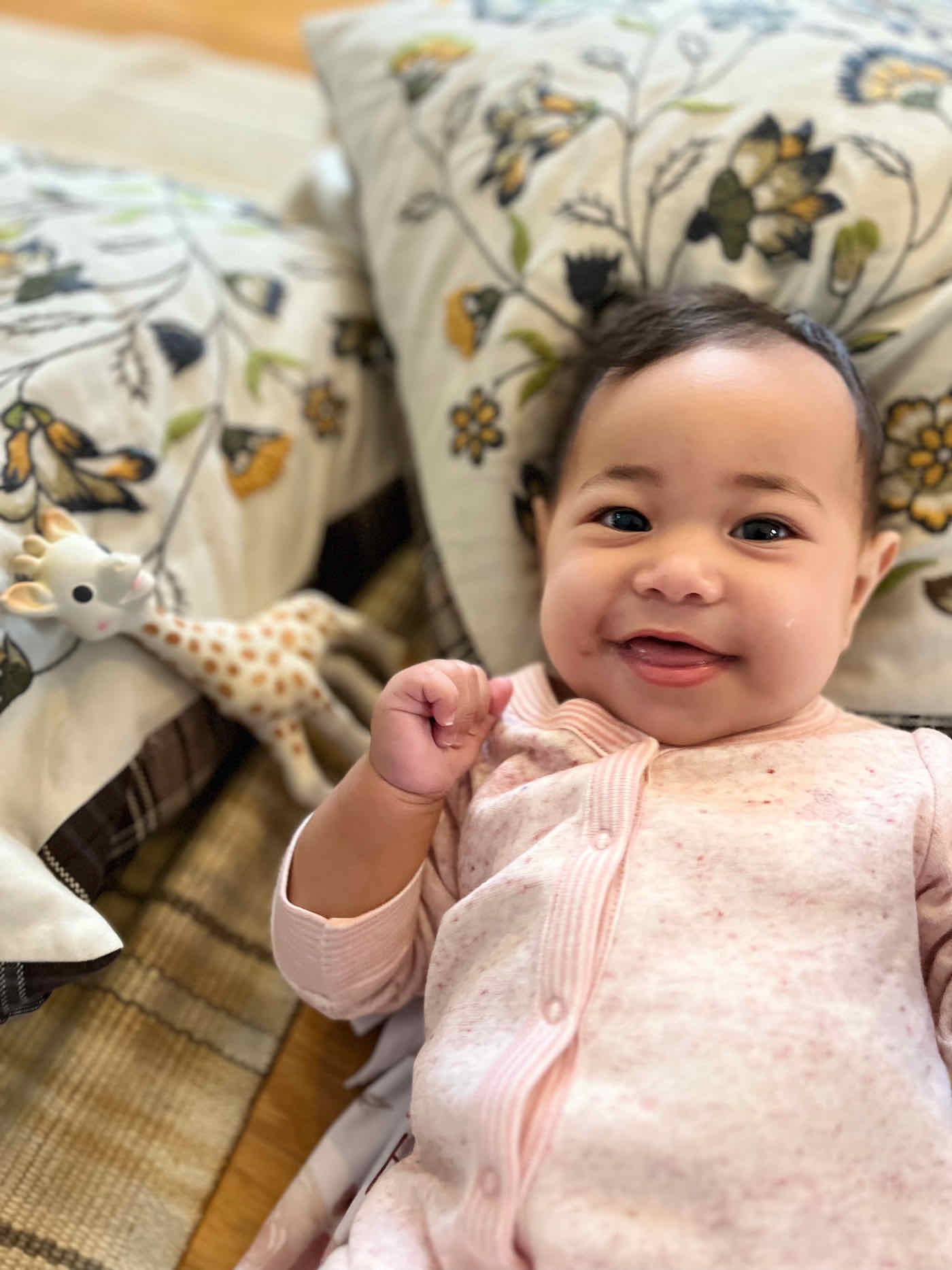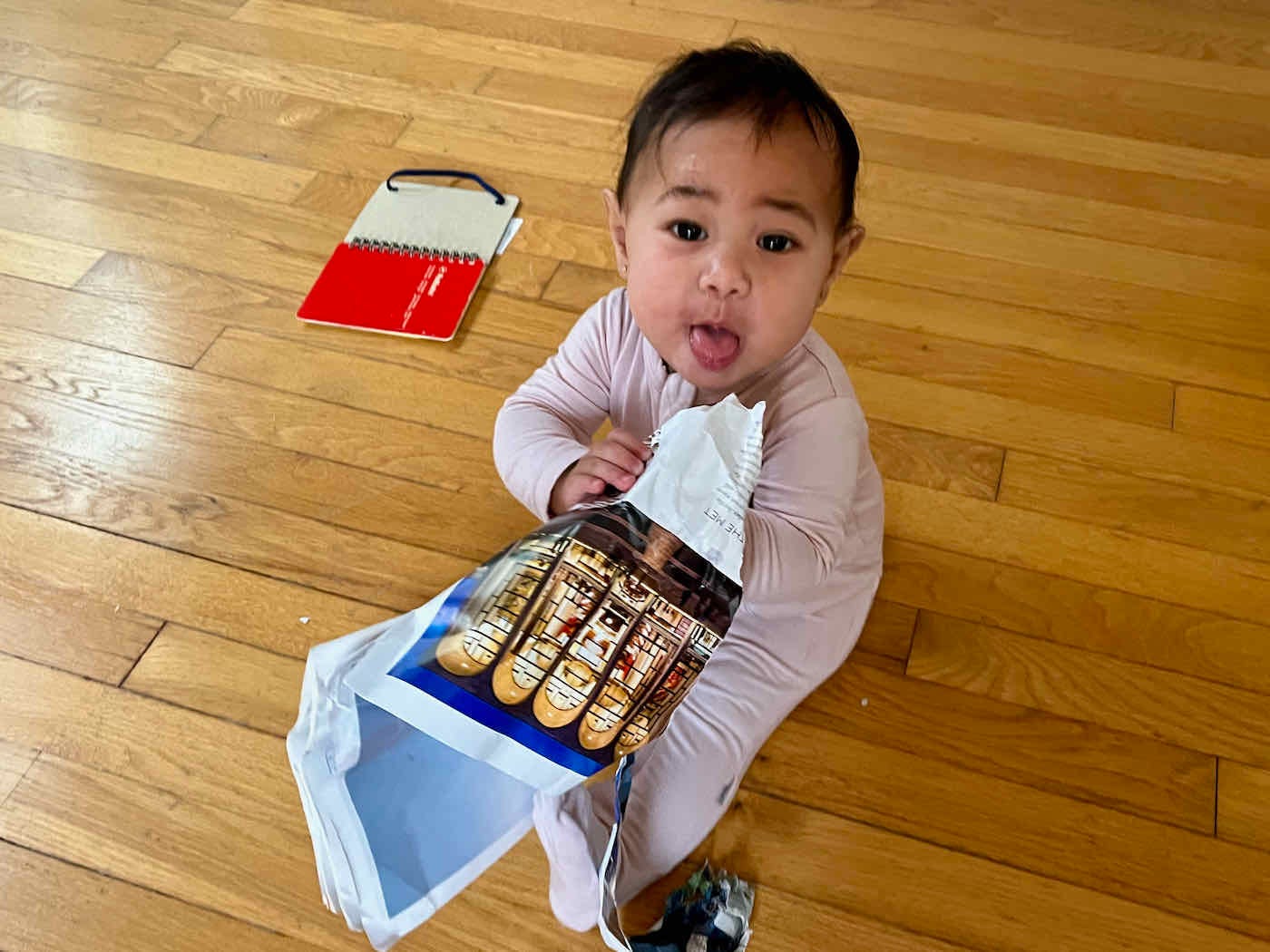The Congregation of Mixed Emotions
Some fragmented thoughts on caring for my niece, the gifts of imperfection, a rogue playing of Hong Kong's protest anthem, and the new book Chingona
Wednesday, November 16
East Sandwich, Massachusetts
Hello, dear reader.
On Tuesday morning—2:30 a.m.? 3? does it really matter?—I was trying to rock my seven-month-old niece, Mia, back to sleep. Her parents have been traveling for a few days, and she’s been staying with us. Mia has a cold. She’s off her normal sleep schedule. She’s gurgly and sweet, mercurial and moody. I adore her—and also I was grumpy and just wanted to get back to bed. I hated that moment—and I loved it too.
I’ve been thinking a lot about the mixed emotions that are such a part of my mundane. So often we rush toward the black and white when reality is all different shades of gray. We live in a world that wants either G.O.A.T.s or goats, heroes or villains, supreme victory or ultimate failure. We glorify or catastrophize. We lust after the seeming simplicity of the poles, when the truth is, we live in the messy and beautiful in-between.
The ordinary reality of caring for Mia has meant easy feedings as well as temperamental ones, long and peaceful naps and short ones that end in a blaze of screams and tears, watching her delight in her toy unicorn and dealing with poopy diapers. Sometimes, she reaches her arms out and enfolds me in a little hug; other times, she sits in my lap, chattering contentedly in a language I can’t understand; still others, she slaps me and scratches my face.
After I posted some pictures of Mia on Instagram, I got several messages telling me some version of the same thing: Mia is perfect. Adults get this treatment too: So often, I see people on social media, saying things like, “You’re perfect just as you are!” I understand the encouraging heart behind these words, which are clearly part hyperbole and part praise. It’s an appealing antidote to all the shame, all the self-loathing, that’s out there and within us too.
Except that it’s just not true, and we know it.
My niece is adorable but she is not perfect—and I don’t want her ever to think that she has to be. I want her to grow up knowing that she is loved in all her beautiful, complicated humanity. I hope she will always have the space to be vulnerable and the structure to be brave. Really, I want that for all of us. I suspect what most of us actually desire is not to be considered perfect just as we are but rather to be loved both as we are and as we are becoming.
Five hundred years ago, Martin Luther called us to perceive the world around us as it is. Citing the cross of Christ as a moral beacon, he wrote, “A theology of the cross calls the thing what it actually is.” To cultivate true humility is to perceive things not as better or worse than they are. For those of us who are Christians, the radiant love of the cross illuminates both beauty and pain, care and cruelty, and everything in between. It gives us the grounding both to delight in its goodness and to lament its disappointments. It reminds us that there’s something beyond the temporal, inviting our openheartedness and growing our courage.
I find my home in the congregation of mixed emotions—amidst the joys and the sorrows, the happiness and the grief, the blah and the meh. Here is the kitchen table, stained with the spilled red wine of meals past; it has borne witness to furious arguments and happy game nights. There on my bookshelf are books I’ve loathed and books I’ve liked—and a whole bunch more that have left me largely indifferent. Once in a while, I hear the sudden bark of the weird, old dog who is both friend and frustration. At the foot of my chair is the child who both delights me and annoys me—and through it all, the love remains.
To tend to the tangle of conflicting feelings is to acknowledge the truth of the already and the not yet of this imperfect world. I want people in my life who can sit with me amidst it all, not ignoring all that’s good, not diminishing what’s glorious, not rushing past whatever makes them uncomfortable, not waving away whatever hurts. I wish to be that kind of friend—brother, husband, uncle, human—too.
As I write to you, Mia has been crawling around the floor of the room that is my study on Cape Cod. A few feet from my work table, there’s a thin cotton rug on which I’ve placed cushions, pillows, three or four of her blankets, and several of her favorite toys. I plop her in the middle of this soft space, and mostly she is content to stay there, draping herself in the soft fabrics and tracing the stripes of the rug.
But once in a while, she decides she wants to push toward the hardwood. She pads over to me, delighted at her own propulsion. A little while ago, I looked down during a Zoom call to realize that she’d immersed herself in a recent issue of The New Yorker—by which I mean she was eating it. Occasionally, she loses her balance, bonks her head, and bursts into tears. Then I pick Mia up, cradle her for a moment until the happy gurgles return, and return her to the blankets. And then we do it all over again.
I wonder if this is what Jesus meant when he said, “Let the little children come unto me.” I don’t think he had any illusions about a child’s perfection. No, I think he knew.
Let them come with their complications and confusions. Let them come to be seen and to be known. Let them come without filter—with their explosions of delight and their outbursts of frustration, with their cranky exhaustion and their desire to be soothed. Let them bonk their heads on the hard things, find their solace and steadiness in my ever-loving arms, and then dare to experience the world around them all over again.
I think this is what it means to be alive. I think this is what it means to be human.
What I’m Listening to: Hong Kong emerged victorious last week at the Asian Rugby Sevens championships in Korea. But that wasn’t the most notable thing. Before a match, when the Hong Kong flag was raised, the anthem that was played wasn’t China’s “March of the Volunteers” but “Glory to Hong Kong,” the unofficial anthem of the pro-democracy protest movement.
Tristan and I have talked about whether we’d visit Hong Kong again under the current regime. My answer right now is probably not. As someone with the equivalent of Hong Kong citizenship, I’ve tweeted and said things that would be enough to be arrested for treason. Simply to play “Glory to Hong Kong” aloud means risking up to three years in prison.
With all that’s going on in the world, I know Hong Kong is not top of mind for most people. I get it. But the culture and the character, the way of life and the freedoms of the city are being destroyed systematically by the Chinese Communist regime. And as someone with profound love for the place, I can’t help but feel some feelings when I remember the words of the anthem: “Though deep is the dread that lies ahead/ Yet still with our faith on we tread.”
Here’s an English version of “Glory to Hong Kong.”
And here’s a Cantonese one.
What I’m Reading: Congratulations to Alma Zaragoza-Petty, whose book Chingona: Owning Your Inner Badass for Healing and Justice was published earlier this month. Alma writes from the particularity of her experience as a Mexican American woman with Indigenous, Black, and Spanish heritage; as an academic; as a bookworm and storyteller; as a beautiful human whose life has been marked by both radiant joy and deep sorrow. Regardless of which of these applies to you too, I think any empathetic reader can find inspiration if they receive what Alma generously shares of her own journey and consider the points of resonance with theirs. I’m sure I’m not the primary target audience for this book. Yet I so appreciate her insights and vulnerability. “I craved a wisdom beyond books,” she writes. “I wanted to fully live and be.”
Before Mia eats the entirety of the New Yorker cover, let me bring this letter to a close. I would like to return my niece to her parents with minimal permanent damage, so please pray for us! What’s on your minds? It’s always a privilege to hold your cares and concerns in prayer too.
Also, I’m starting to plan what will be on our Thanksgiving table. (Okay, I should be honest: I’ve been thinking for months about what will be on our Thanksgiving table.) I’d love to know whether, other than the old standards, there are particular—and particularly unusual—dishes that always make an appearance at your holiday meal.
As ever, I am so grateful we can stumble through all this together, and I’ll try to write again soon.
All best,
Jeff






Oh Jeff, this is what I needed to hear today as I sit in the messy mess of my first call with all of what I know and have yet to learn, all of who I already am and who I am in the process of becoming, of wanting to get it all right the first time and just being a normal human for whom that is unrealistic. Any call back to the mess of the middle has become a strange but sure comfort for me in the last year or two, and here it is again in my email inbox from you. Thank you.
To answer your question about Thanksgiving (my favorite holiday!), my family will be hosting our new Afghan refugee friends for their first Thanksgiving ever. I have secured a halal turkey -- a task not as straightforward as one might think -- and have been planning a variety of vegetarian side dishes. We usually host international students from Notre Dame, so dietary restrictions on Thanksgiving are not new to me and I can lean on some old favorites: rosemary-garlic mashed potatoes, roasted butternut squash and onions, pan-seared Brussels sprouts, to-die-for mushroom stuffing (that won't get stuffed), and chocolate-swirled pumpkin pie with a pecan crust. Most of the ingredients will come from our local farmer's market, and on Wednesday (which happens to be my birthday), I will get to spend the entire day in my kitchen preparing food from the land I inhabit for people I love. And a bottle of wine. I can't wait.